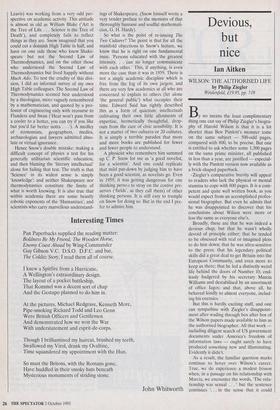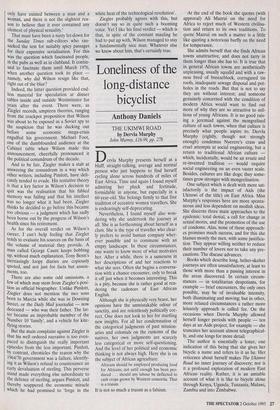Devious, but nice
Ian Aitken
WILSON: THE AUTHORISED LIFE by Philip Ziegler Weidenfeld, L19.95, pp. 518 By no means the least complimentary thing one can say of Philip Ziegler's biogra- phy of Harold Wilson is that it is a lot shorter than Ben Pimlott's monster tome on the same subject — 500-odd pages, compared with 800, to be precise. But one is entitled to ask whether some 1,300 pages on the same prime minister, all published in less than a year, are justified — especial- ly with the Pimlott version now available as a brick-shaped paperback.
• Ziegler's comparative brevity will appeal to readers who lack the physical or mental stamina to cope with 800 pages. It is a com- petent and quite well written book, as you would expect from an accomplished profes- sional biographer. But even he admits that he was disappointed to discover that his conclusions about Wilson were more or less the same as everyone else's.
Broadly, these are that he was indeed a devious chap, but that he wasn't wholly devoid of principle either; that he tended to be obsessed with real or imagined plots to do him down; that he was ultra-sensitive to the press; that his legendary political skills did a great deal to get Britain into the European Community, and even more to keep us there; that he led a distinctly weird life behind the doors of Number 10, end- lessly badgered by his secretary Marcia Williams and destabilised by an assortment of office Iagos; and that, above all, he behaved kindly to almost everyone, includ- ing his enemies.
But this is hardly exciting stuff, and one can sympathise with Ziegler's disappoint- ment after wading through box after box of the Wilson papers made available to him as the authorised biographer. All that work — including diligent search of US government documents under America's freedom of information laws — ought surely to have produced something new and illuminating. Evidently it didn't.
As a result, the familiar question marks continue to hover over Wilson's career. True, we do experience a modest frisson when, in a passage on his relationship with Marcia, we encounter the words, 'The rela- tionship was sexual . .. ' but the sentence continues `... in the sense that it could only have existed between a man and a woman, and there is not the slightest rea- son to believe that it ever contained any element of physical sexuality.'
That must have been a nasty let-down for the Sunday Times sub-editors who ran- sacked the text for suitably spicy passages for their expensive serialisation. For this was the question which fascinated people, in the pubs as well as in clubland. It contin- ued to fascinate them until March 1976, When another question took its place — namely, why did Wilson resign like that, right out of the blue?
Indeed, the latter question provided end- less material for speculation at dinner tables inside and outside Westminster for years after the event. There were, as Ziegler records, umpteen theories, ranging from the crackpot proposition that Wilson was about to be exposed as a Soviet spy to the suspicion that he was ducking out before some economic mega-crisis engulfed his government. Michael Foot, one of the dumbfounded audience at the Cabinet table when Wilson made this announcement, cheerfully pronounced it the political conundrum of the decade.
And to be fair, Ziegler makes a stab at answering the conundrum in a way which other writers, including Pimlott, have deli- cately tended to evade. His tentative theory is that a key factor in Wilson's decision to quit was the realisation that his fabled memory was failing and that his intellect was no longer what it had been. Ziegler thinks he decided to go before this became too obvious — a judgment which has sadly been borne out by the progress of Wilson's health since his retirement.
As for the overall verdict on Wilson's career, I can't help feeling that Ziegler tends to evaluate his sources on the basis of the volume of material they provide. A man called George Caunt keeps bobbing Up, without much explanation. Tony Benn's increasingly loopy diaries are copiously ' quoted, and not just for facts but assess- ments, too.
There are also some odd omissions, a few of which may stem from Ziegler's posi- tion as official biographer. Unlike Pimlott, Ziegler does not mention the two sons born to Marcia while she was in Downing Street, or the Daily Mail journalist — now deceased — who was their father. The lat- ter became an improbable member of the Number 10 'family', and a vehicle for kite- flying stories.
But the main complaint against Ziegler is that his well ordered narrative is too even- paced to distinguish the really important episodes from the less important. Pimlott, by contrast, chronicles the reason why the 1964/70 government was a failure, identify- ing it as Wilson's refusal to countenance an early devaluation of sterling. This perverse stand made everything else subordinate to the defence of sterling, argues Pimlott, and thereby scuppered the economic miracle Which he had promised to 'forge in the white heat of the technological revolution'.
Ziegler probably agrees with this, but doesn't say so in quite such a booming voice. Yet I like his final verdict — which is that, in spite of the constant mauling he had to put up with, Wilson managed to stay a fundamentally nice man. Whatever else we know about him, that's certainly true.



















































 Previous page
Previous page